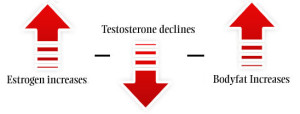More Sugar in your Diet = More Estrogen in your Body
Metabolic syndrome is said to be present when three out of five biomarkers appear: elevated fasting plasma glucose, abdominal obesity, elevated blood pressure, low high-density lipoprotein (HDL cholesterol) levels, and/or high serum triglycerides. But what’s most interesting about those five biomarkers, is that the first one (elevated fasting plasma glucose) is most easily corrected by dietary intervention:eating less carbohydrates in general, and more specifically, less sugar.
 It’s somewhat obvious that eating less sugar will also help lower fasting plasma glucose – and help prevent abdominal obesity. But less obvious is the other effects overconsumption of sugar has on the metabolism. For example, in a study* that examined men consuming 150g of sugar per day, it was found that cutting their consumption to 55g/day resulted in a 25% decrease in estrogen (technically estradiol, the more potent form of naturally occuring estrogen). To give you an idea, that level of estrogen reduction is what’s found with some (weaker) prescription anti-estrogen drugs.
It’s somewhat obvious that eating less sugar will also help lower fasting plasma glucose – and help prevent abdominal obesity. But less obvious is the other effects overconsumption of sugar has on the metabolism. For example, in a study* that examined men consuming 150g of sugar per day, it was found that cutting their consumption to 55g/day resulted in a 25% decrease in estrogen (technically estradiol, the more potent form of naturally occuring estrogen). To give you an idea, that level of estrogen reduction is what’s found with some (weaker) prescription anti-estrogen drugs.
A hundred and fifty grams of sugar sounds like it’s alot, right? But think about that huge table full of sports drinks on the sideline of every professional sport. Or consider the endurance and ultra-endudrance community, who not only drink tons of sugary carbs, but also take them in gel form.
“Get some simple sugars after training” – we hear coaches saying. Their athletes aren’t getting fatter, so obviously they’re not eating too much. But even if we’re burning tons of calories, the sugar is doing damage – it’s raising estrogen levels (and as a result, likely lowering testosterone levels via negative feedback).
The lesson here isn’t to avoid carbs entirely – but to realize that sugar isn’t just a quick energy source, it’s potentially a source of hormonal and metabolic damage.
*Here’s that study we told you about:
Ann Nutr Metab. 1988;32(2):53-5.
Dietary sucrose and oestradiol concentration in young men.
Yudkin J1, Eisa O.
Author information
Abstract
The dietary sugar of 15 young men was reduced from their habitual approximately 150 g/day to about 55 g/day. After 3 weeks, the concentration of oestradiol in their plasma fell by about 25%. Resumption of their habitual intake of sugar for 2 weeks restored the oestradiol concentration to its previous value. The results provide further evidence that dietary sugar can be one of the causes of coronary heart disease, and support the view that the underlying mechanism producing the disease is a disturbance in hormone balance.


